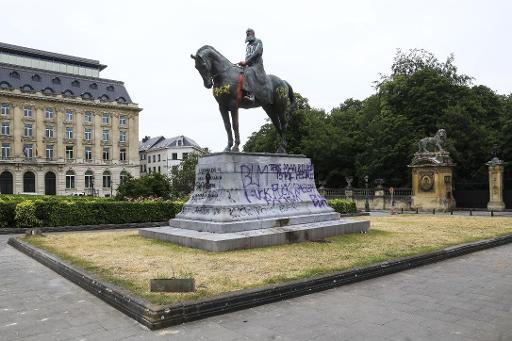A monument to commemorate the victims of the colonisation should be erected next to the statue of Leopold II on Brussels' Place du Trône in Brussels, according to Brussels Minister Bernard Clerfayt.
"Belgium has not yet sufficiently faced up to its colonial past," according to Clerfayt. He put forward a concrete proposal that has to transform the Place du Trône, where the equestrian statue of Leopold II is located, in memory of the colonial era.
"The memorial would be next to the statue of Leopold II, just behind the royal palace. Removing symbols from history will not make people smarter," Clerfayt told La Dernière Heure.
In recent weeks, several statues of Leopold II have been defaced, damaged or sometimes stolen throughout the country. According to Clerfayt, such vandalism is "not the best way" to increase the historical awareness among the Belgian people.
Related News
- Leopold II statue defaced again after clean-up
- Leopold II statues in Brussels could be removed, says minister
- Leopold II bust pulled from pedestal in Brussels
"We have to rewrite this page of Belgian history together, because many people still do not know or do not want to know what happened," he said. "But if we erase everything, we put a brake on those memories and on the evolution of a society," Clerfayt added.
With his party, Clerfayt therefore proposes to erect a memorial in Brussels, both to learn about Belgian relations with Congo and to commemorate the victims of colonisation. "Why not on Place du Trône?" he said.
The location would place the new monument directly opposite Leopold II. "It is also near the Leopold district, where the bourgeoisie built many mansions under Leopold II's reign, and near the Matongé district, a symbol of the link between the two countries," Clerfayt said.
"Additionally, the square is situated on the border of the medieval centre - within the Pentagon - and the modern Brussels of the nineteenth century, symbolising industrial growth and colonisation," he added.
Clerfayt proposes a national call to finance the new monument, so both citizens and companies could make a donation, and invited the King Baudouin Foundation to manage it.
"This foundation bears the name of Baudouin I, who was the king who returned the Congo to the Congolese. Additionally, everyone recognises the quality of the work of the King Baudouin Foundation on socially difficult themes," he added.
Maïthé Chini
The Brussels Times

